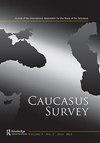战后散居挪威的车臣人及其法律模式构想
IF 0.5
Q3 AREA STUDIES
引用次数: 2
摘要
摘要本文考察了散居挪威的车臣人对法治的理解是如何形成的。作为我们对车臣法律多元化和传统阿达特法、宗教教法和俄罗斯世俗法共存的研究的出发点,我们通过以下问题来审视在东道国生活的影响:车臣侨民(这里被定义为冲突引发的侨民)如何看待和内化挪威的法律模式?他们认为什么样的国家治理对自己和车臣未来都是理想的?进一步:他们的选择的根本原因可能是什么?我们认为,正如车臣不同的暴力浪潮造就了今天表现出特定社会、文化和政治特征的不同侨民社区一样,后苏联-车臣战争后最新一波被迫移民欧洲的浪潮可能对这些侨民的法律偏好产生了特定的影响。从我们深入的个人访谈和调查中可以看出,这是对挪威国家治理和法治的逐步适应和调整,表明了身份变化和法律偏好之间复杂而共同的关系。本文章由计算机程序翻译,如有差异,请以英文原文为准。
The Chechen post-war diaspora in Norway and their visions of legal models
ABSTRACT This article examines how understandings of the rule of law are shaped in the Chechen diaspora in Norway. Taking as our point of departure studies of legal pluralism and the co-existence of traditional Adat, religious Sharia and Russian secular law in Chechnya, we examine the effect of living in a host country by asking: How do members of the Chechen diaspora, here defined as conflict-generated diaspora, view and internalize legal models in Norway? What type of state governance do they see as ideal for themselves and for Chechnya in the future? Further: what might the underlying explanation for their choices be? We assume that just as different waves of violence in Chechnya created different diaspora communities that today exhibit specific social, cultural and political traits, the latest wave of forced emigration to Europe after the post-Soviet Russo–Chechen wars may have made specific imprints on the legal preferences of this diaspora. The picture that emerges from our in-depth individual interviews and surveys is one of gradual adaptation and adjustment to Norwegian state governance and rule of law, demonstrating the complex and co-constitutive relationships between changing identities and legal preferences.
求助全文
通过发布文献求助,成功后即可免费获取论文全文。
去求助
来源期刊

Caucasus Survey
Arts and Humanities-History
CiteScore
1.30
自引率
9.10%
发文量
4
期刊介绍:
Caucasus Survey is a new peer-reviewed, multidisciplinary and independent journal, concerned with the study of the Caucasus – the independent republics of Armenia, Azerbaijan and Georgia, de facto entities in the area and the North Caucasian republics and regions of the Russian Federation. Also covered are issues relating to the Republic of Kalmykia, Crimea, the Cossacks, Nogays, and Caucasian diasporas. Caucasus Survey aims to advance an area studies tradition in the humanities and social sciences about and from the Caucasus, connecting this tradition with core disciplinary concerns in the fields of history, political science, sociology, anthropology, cultural and religious studies, economics, political geography and demography, security, war and peace studies, and social psychology. Research enhancing understanding of the region’s conflicts and relations between the Russian Federation and the Caucasus, internationally and domestically with regard to the North Caucasus, features high in our concerns.
 求助内容:
求助内容: 应助结果提醒方式:
应助结果提醒方式:


